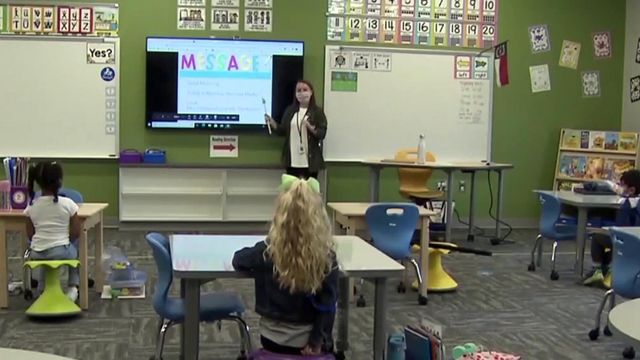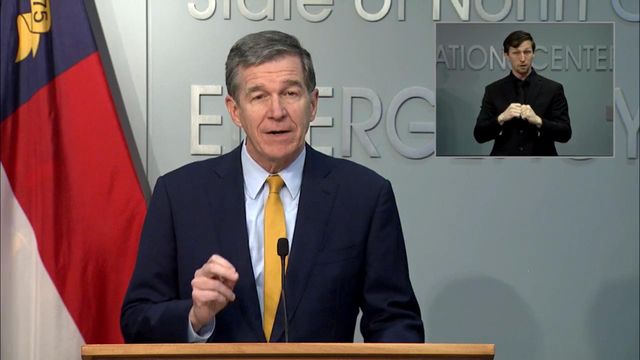Cooper pitches $2,500 bonus for teachers, $1,500 for other school workers
Gov. Roy Cooper pitched a $2,500 bonus for teachers and principals Thursday, saying the state should dip into its considerable savings to bolster educators' checks this spring.
Posted — UpdatedThe governor also proposed a $1,500 bonus for non-certified school employees and a $2,000 bonus for community college and University of North Carolina System personnel. All of the bonuses would be paid in April to people employed as of Feb. 1, costing a total of $468 million.
"This is not an unreasonable request in an emergency situation," he said. "I think this is an important signal to send."
Leadership for the Republican legislative majority indicated they'd rather see teacher compensation discussed as part of the state's regular budget process, as opposed to a faster moving emergency pandemic relief bill.
Cooper's proposal comes two days after he urged school districts still in remote learning to start bringing more students back into classrooms. That angered some teachers, who called on him and other state leaders to let them get vaccinated against coronavirus first.
"We're asking Gov. Cooper to figure that out for educators here in North Carolina so that we can resume in-person instruction safely," said Tamika Walker Kelly, president of the North Carolina Association of Educators.
Many other states are vaccinating teachers, she noted, and more than 70,000 people have signed a petition urging Cooper to move teachers up in the state's vaccination priority list.
Walker Kelly said the bonuses for teachers and other school personnel are needed and would be much appreciated by all.
"But it's not a vaccine, and it won't get us quicker into in-person instructional buildings any faster," she added.
That federal money will likely total $4 billion, which is on top of what the state got last year from a previous round of federal stimulus and separate from what it may get out of new stimulus talks going on now in Washington, D.C.
During the news conference, Cooper laid out a wish list of sorts for the federal money, much of which was already covered in that bill. But he also wants to dip into state reserves, built up over $4 billion, for programs that might not be permissible uses of the federal money.
Most of the $695 million he wants in state money would go to educator bonuses, but the governor also asked lawmakers to consider:
- $50 million to continue hazard pay for state employees, particularly law enforcement and corrections personnel
- $64.5 million for the State Employees Health Plan, which has incurred costs from the pandemic and is funded by a blend of taxpayer and employee contributions
- $30 million to extend high-speed internet around the state. This is in addition to $30 million already moving toward broadband expansions, and the governor has called previously for a $250 million bond package to expand high-speed internet access further.
- $37 million to help small businesses, with a focus on businesses owned by women or minorities through the ReTOOLNC program ($20 million), new funding for businesses already helped last year by the Rapid Recovery Loan program overseen by Golden LEAF ($11 million), $3 million for tourism and other marketing and $3 million for small-business counseling
"This budget proposal provides the steps to not only defeat this pandemic, but shape a stronger future for our state," he said.
The governor also reiterated his call for a boost in the state's unemployment benefits, which are among the country's lowest.
He wants to increase the state's maximum benefits duration to 26 weeks and increase the top weekly payout from $350 to $500. He also asked for a formula change that would bring the state's unemployment tax down slightly and said the state's Unemployment Trust Fund, which the tax feeds, stands at a healthy $2.59 billion.
All of the spending and changes would require legislative approval, and the General Assembly's Republican majority tends to go its own way on the budget. Teacher pay has been a particular flashpoint between Cooper, a Democrat, and the GOP majority in recent years, contributing to a series of budget stalemates that actually helped the state bring its cash reserves up to where they are now.
"It’s ironic that Gov. Cooper lamented teachers not receiving a pay raise for two years considering he vetoed numerous teacher pay raises passed by legislative Republicans,” said Lauren Horsch, a spokeswoman for Senate President Pro Tem Phil Berger.
Joseph Kyzer, spokesman for House Speaker Tim Moore, said in a statement Thursday afternoon that lawmakers will consider the governor's proposals "through the usual legislative budget process with a consensus revenue forecast to inform those decisions."
The revenue forecast, which lays out how much money state government expects to have on hand for the coming budget year, should be available late next week, Cooper's budget director, Charlie Perusse, said Thursday.
There's quite a bit of overlap, though, between the priorities the governor laid out Thursday – many of which were repeats from his previous proposals – and measures Republican lawmakers already have on the way. For example, the House passed a measure Thursday that would forgive liquor license fees for bars forced to close for much of this year.
Cooper said he's glad lawmakers are working quickly to allocate the federal aid and hopes to work with them in the coming weeks to get some of his priorities not in the bill that cleared the legislature addressed.
In addition to the state spending, Cooper's proposal also laid out his hopes for federal coronavirus money not yet allocated:
- About $700 million for ongoing vaccination, testing and tracing measures
- $336 million for child care and development block grants
- $258 million for highway infrastructure
- $65 million for airports
- $47 million for community mental health services
Lawmakers included about $95 million for vaccination efforts in a bill they passed Thursday, and budget writers in both the House and the Senate have said another bill, or bills, laying out coronavirus spending will be coming soon.
• Credits
Copyright 2024 by Capitol Broadcasting Company. All rights reserved. This material may not be published, broadcast, rewritten or redistributed.





